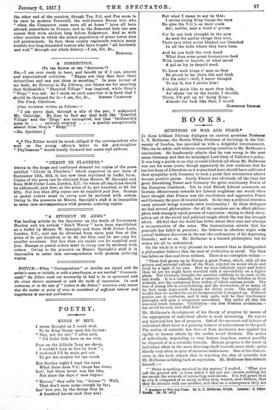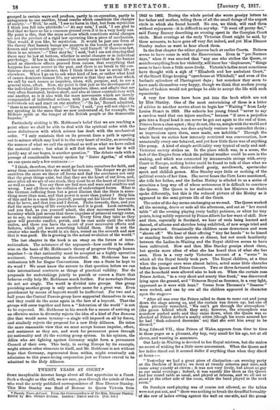BOOKS.
QUESTIONS OF WAR AND PEACE.*
IN these brilliant Platonic; dialogues on current questions Professes L. T. Hobhouse, the Martin-White Professor of Sociology in the Uni- versity of London, has provided us with a delightful entertainment. This can be safely said without committing ourselves to Mr. Hobhouse's conclusions. He handsomely admits that he was wrong in the past about Germany and that ho misjudged Lord Grey of Fallodon's policy. It was long a puzzle to us why avowed Liberals (of whom Mr. Hobhouse was one for some years, though apparently he now confesses that he has lost hope of Liberalism as it is practised here) should have cultivated their sympathy with Germany to such a point that extenuation almost became positive praise. Surely France was obviously all the timo the great liberalizing Power and Germany the great reactionary Power of the European Continent. Yet to read British Liberal comments on German offensiveness towards her Liberal neighbour one would often have thought that France was the reactionary and aggressive Power and Germany the poor ill-treated lamb. So far may a political obsession carry rational beings towards utter irrationality 1 In these dialogues we find several philosophers—for all the speakers are in effect philoso- phers with strangely equal powers of expression—trying to think them- selves out of the social and political tangle which the war has brought about. All feel that the world has fallen about their cars and attempt a reconstruction of the ruins. The humanitarian admits that his principle has failed in practice ; the believer in absolute might with cynical boldness discovers in the war the confirmation of his depressing formula ; and so on. Mr. Hobhouse is a learned philosopher, but ho writes for all to understand.
On the whole it is very pleasant to be assured that so distinguished a philosopher believes that the soul of civilization is saved. The blow has fallen on that soul from without. There is no corruption within :— " There had grown up in Europe a giant Power, which, with all the science and material culture of the West, rejected its newer ideals and lived by a light of its own. Had we been infinitely wiser and better than we are we might have wrestled with it successfully on a higher plane. But Germany brought the question suddenly to an issue of life and death. It is a calamity, but a calamity that has befallen us from without, not the corruption from within of which nations perish. The loss of young life is overwhelming, and tho destruction of so many of its best must impoverish Europe for thirty years. The surplus of wealth that we needed for social reorganisation is mopped up. Political parties are in confusion, and it may quite well be that reactionary principles will gain a temporary ascendant. But under all this the essential truth remains. Civilisation—our free Western civilisation— has saved its soul, and shall live."
Mr. Hobhouso's development of his theory of progress by means of the aggregation of individual efforts is most interesting. Ho rejects any hard-and-fast law of progress. Out of the successes and failures of individual effort there is a growing balance of achievement to the good. The notion of scientific law derived from mechanics was applied too rigidly to human affairs by the earlier social thinkers. The action of individuals, responding to very human impulses, cannot possibly be disposed of in a scientific formula. Human progress is the result of individual effort in the mass directing itself towards some ideal—quite blindly very often in spite of immense enthusiasm. One of the dialecti- cians in the book objects that in rejecting the idea of scientific law Mr. Hobhouse is falling back on mysticism. Mr. Hobhouse then defends himself :- "' There is nothing mystical in the matter,' I replied. What you call the general will—a term which I did not use—moans nothing for me except the network of interacting individuals. You will grant that moiety is composed of so many milion men, women, and children, that they do interact with one another, and that as a consequence they are
• Questions of War and Peace. By L. T. Hobhoure. Didtt. London.: T. Fisher trawl& M. ed. net.] grouped in certain ways and produce, partly in co-operation, partly in antagonism to one another, broad results which constitute the changes of society.'—' Well,' he said, I see no harm in that, but from mysticism I think you fall into platitude.'—' At any rate,' I said, I am glad to find that we have so far a common ground even if it be a very lowly one. My point is this, that the mass actions which constitute social changes are not the product of a rigid law operating like a piece of mechanism. That would, if you like, be mysticism. It would be just one form of the theory that human beings are puppets in the hands of some super- human and quite occult agency.'—' But,' said Burnell. if there is no law, there is no science.'—' That may be,' I said, but I am not denying that there may be law at bottom, whether in social changes or in individual psychology. If law in this connection merely means that in the human mind as elsewhere effects proceed from causes, that everything that happens has some source in the past, and there is no break in the con- tinuous stream of existence, then I think there is law in social life as elsewhere. When I go on to ask what kind of law, or rather what kind of causes dominate human life, my answer is that they are those which wo call by such names as impulses, ideas, will, purpose, and, to use a general term, effort. Now, my point is that just as the development of the individual life proceeds through impulses, ideas, and efforts that are very often frustrated, broken short, and also at times contradictory with one another, so is it also with the mass movements which are merely compounded of individual actions, with just this differenoe, that the individuals act and react on one another.'—' So far,' Burnell admitted,
there is no mysticism, I agree.'—' Then,' I said, ' you will not object to my speaking in the sense that we now understand of, for example, the Hellenic spirit- or the temper of the British people or the democratic impulse.' " Particularly striking is Mr. Hobhouse's belief that we are reaching a point where we shall be able to deal with the spiritual order with the same definiteness with which science has dealt with the mechanical order. " I only maintain that on its present lines a path is opening out to science which may lead it to the very heart of reality, so revealing the sources of what we call the spiritual as well as what we have called the material order ; but what it will find there, and how far it will justify any of our hopes, is another question." The debate ends with a passage of considerable beauty spoken by " Sister Agatha," of which we can quote only a few sentences : —
" I think, therefore, that we must go back into ourselves for faith, and away from ourselves into the world for reason. The deeper we go into ourselves the more we throw off forms and find the assurance not only that the great things exist, but that they are the heart of our lives, and, since after all we are of one stock, they must be at the heart of your lives as well as mine. You say there are bad men and wars and cruelties and wrong. I say all these are the collision of undeveloped forms. What is the German suffering from but a great illusion that the State is some- thing more than man, and that powor is more than justice 1 Strip him of this and ho is a man liko yourself, pouring out his blood for the cause that he loves, and that you and I detest. Probe inwards, then, and you find the same spring of life everywhere and it is good. Look outwards, and you find, as you yourself admit, the slow movement towards a harmony which just means that these impulses of primeval energy come, so to say, to understand one another. Every form they take as they grow will provoke conflict, perish, and be cast aside until the whole unites, and there you have the secret of your successive efforts and failures, which yet leave something behind them. God is not the creator who made the world in six days, rested on the seventh and saw that it was good. He is growing in the actual evolution of the world."
The last chapter in the book is an essay on the future of inter. nationalism. The substance of the argument—how could it be other- wise on the basis of Mr. Hobhouse's theory of progress through human impulses ?—is that nationality must be accepted as a highly operative sentiment. Cosmopolitanism is discredited. Mr. Hobhouse has no enthusiasm left for Hague Conventions. How can a State be kept to its word ? We must know the answer to that question before we can take international contracts as things of practical validity. Nor do proposals for undertakings jointly to punish or coerce a State that behaves evilly help Mr. Hobhonse much further. For nowadays States do not act singly. The world is divided into groups. One group punishing another group is only another name for a great war. Even punishment by means of boycott would be ineffectual. For two and a half years the Central Powers group have supported themselves in war, and they could do the same again in the face of a boycott. That the groups will come together and form a " federation of the world " is not to be expected. Mr. Hobhouse in his search for a means of arriving at an effective union in diversity rejects the idea of a kind of Pax Romanis (for that would mean tyranny—a single will imposed on all by force), and similarly rejects the proposal for a new Holy Alliance. He takes the more reasonable view that we must accept human impulse, effort, and sentiment as they aro, and work for permanent peace through (a) nationality and (b) the existing group system. In his opinion, the Allies who are fighting against Germany might form a permanent Council of their own. This body, in saving Europe by its example, might attract other elements to itself, and Mr. Hobhouse is not without hope that Germany, regenerated from within, might eventually ask admission to this peace-loving corporation just as France craved to be admitted to the Holy Alliance.











































 Previous page
Previous page